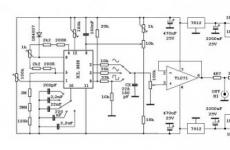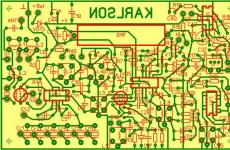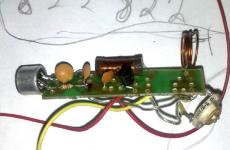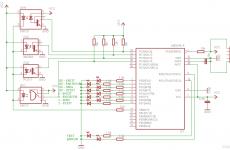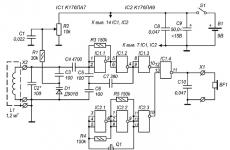Good evening in Chinese Russian pronunciation. How to say in Chinese (basic words and expressions in Russian)
Dear readers!
Welcome to the blog website!
The words of greeting and farewell in the language of any people are inextricably linked with culture. If you look at the meaning of these words, you can learn a lot of new and interesting things.
I think that people who study Chinese or are simply interested in Chinese culture would be interested to know What words talking to each other meeting in China and how it depends on the situation.
Well, let's try to figure it out.
"Hello" in Chinese
Many people know that "hello" in Chinese "no hao"(你好 - Nihao). The character "你" means "you", and "好" means "good". For some peoples, the greeting consists of a wish for good and an interest in whether everything is fine. For example, the Chinese - "ni hao", the Mongols - "sain bayna". In Russia, this is “hello”, in which we wish the interlocutor health. I used to think that "ni hao" in China is the most commonly used greeting phrase, but later I became convinced that this is not so. It is most often pronounced in the following cases: in a formal setting, when meeting with a very respected or unfamiliar person. For example, in educational institutions students greet the teacher like this: "Laoshi hao - Hello, teacher" (老师, Laoshi - teacher).
Words "Good morning"(早上好 - Zaoshang hao or simply 早 - Zao) and "Good evening"– (晚上好 – Wanshang hao) are used infrequently, usually in formal settings. I didn't hear anything about "good afternoon" 🙂
Have you eaten?
This phrase confuses many foreigners. So it was with me. In the first month of my stay in China, the teacher turned to us: "Have you eaten?"(吃饭了吗 - Chifan le ma). I was surprised by this question, because we had just met. Later I found out that it is very popular greeting in China. It is usually used in the pre-lunch and afternoon hours, and even more often in the evening: before and after dinner. "Have you eaten?" does not mean an invitation to dinner or a question about whether you have eaten. This tradition is associated with the historical situation in China and the famine, because of which people are accustomed to pay great attention to food. In response, you do not need to say: “Yes, I had lunch / No, I have not had lunch yet.” Enough to wave your hand.
situational greeting
Ways of greeting between acquaintances are very popular. depending on circumstances. For example, when meeting in the morning, you can often hear the words “To work?” (上班呀 - Shangban ya), "To study?" (上课 - Shangke). In the evening: “Home?”, “Coming back?” (回来了 - Huilai la). Seeing that you are busy with something, the Chinese may state: “Busy?” (忙呢 - Mang ne). It is customary to answer this greeting in accordance with the question. For example, to the question "To work?" answer "Yes/No". People who know each other well can exchange pleasantries, a couple of phrases about family, children, business.
Recently, young people often use English words Hi! And Hello! If a lot of time has passed since the last meeting, then the Chinese will say: "have not seen each other for a long time" (好久不见了 - Haojiu bu jianle). Or they will resort to a joke form that is used in a circle of close friends: “Are you still alive?” (你还活着吗 - Ni hai huozhe ma).
It turns out, except for everyone famous phrase“ni hao” there are many other, most diverse ways of greeting that we met with.
I will give you the most common list of how to say hello in Chinese, not limited to a simple "ni hao". Let's start with the most banal phrases that everyone starts with, they are also the simplest and most common. You can say them everywhere, to everyone and always, and then we will analyze various options greetings.
The simplest greetings in Chinese:
- 你好!- Hello!
- 您好! - Hello! (respectfully)
- 你们好!- Hello! (for a group of people)
- 大家好! Hello everyone! (for a group of people, more informal)
The following phrases are very informal, a bit western. This is how you can say hello to very good friends.
- 你好呀, 哥们儿! - Salute, bro! (options: "bro", "dude", "boy" - a very colloquial and informal appeal to a male person)
- 今天怎么样,女士? — How are you, lady? (Same colloquial form, since the appeal is usually at the beginning of the phrase)
- 哈喽! — Halow! (phonetic tracing paper from the English “Hello”)
Standard greetings depending on the time of day.
- 早上好 ! — Good morning! (usually the time is emphasized before 10:00 am, although no one forbids you to say this phrase at 10:30, for example.)
- 上午好! - Good morning! (emphasis on time from 10:00 am to 12:00 pm)
- 中午好! - Good afternoon! (emphasis on the time around 12:00 noon, i.e. noon)
- 下午好! - Good afternoon! (emphasis on the time from 12:00 noon to sunset)
- 晚上好! — Good evening! (emphasis on the time from sunset to midnight)
Official greetings:
You can say hello to a person and focus on his position. For example, this is how you can greet your boss, teacher, doctor friend, etc. And first you say to whom you are addressing, and then you greet this person:
- 老师,您好! — Hello, teacher!
- 王先生,您好! — Mr. Wang, hello!
- 王大夫,您好! — Doctor Wang, hello!
Greeting question:
In addition, you can say hello through interrogative sentence. The simplest and most famous greeting in the form of a question is:
- 你好吗? — How are you?
More common welcome questions:
However, there are more complex variants of such welcome questions. It is not possible to predict all the options, because, most often, they are based on the situation of communication, that is, for example, from where you are going or what you have already done. For example, the most common question is about food:
- 吃过饭了吗? 吃饭了吗? 吃了吗 ? — Have you eaten yet?
General questions regarding your plans:
- 出去啊? — Went somewhere? (meaning: take a walk, on business)
- 到哪儿去? - Where are you going? Where are you going?
Question-greeting, based on the assumptions of the speaker:
- 去图书馆吗? Are you going to the library?
- 去买东西吗? Are you shopping?
- 上班去啊? - To work?
- 下班了吗? - From work?
- 去上学吗? — To study?
Such questions usually do not require full and detailed answers. The Chinese do not expect them from you. It's like part of the etiquette. By asking such questions, the Chinese try to show their participation and interest in your affairs.
Hi Hello)- nihao
Bye see you)- zaizen
Thank you- sese
Thank you very much!- Sese, feychang fanse!
Happy New Year- xing nien kwai le, Wo zhu ni xin nian,
I wish you a happy new year- Zhu xin nian kuai yu, Gonghe xin nian, Gonghe xinxi
Do you speak English?- No fuck sho inwen ma?
Please- Buyun se
Sorry- Dui buti
What is your name?- Ni jiao shemme mingzi?
Yes- Shi
No- Bushy
Do you want to dance?- Ni xiang tiao wu ma?
I love you!- Oh no!
I- whoa
We- wo-man
You- neither
You- nin
You- ni-men
They- ta-men
What is your name?-- ni-jo she me min dza?
Fine-hao
Badly- boo hao
Wife- chi-ze
Husband- chan-fu
Daughter- new art
Son- arze
Mother- Mother
Father- dad
Friend- pani-yo
Numbers
zero- lin
one- And
two- ar
three- dignity
four- se
five- woo
six- leu
seven- chi
eight- pa
nine- gio
ten- shi
twenty- ar shi
thirty- san shi
fourty- sy shi
fifty- wu shi
one hundred- and share
thousand- and chen
million- and pai wuan
Shops and restaurants
What it is?- Jo she she ma?
I will buy it- woo-mai
You have...?- niyo-me yo...?
Open- kai
Closed- kuan
Little, little- and ti ar
A lot of- hen-tuo
All- chuen pu
Breakfast- zao-tsang
Dinner- u-tsang
Dinner- wan-tsang
Bread- miem pao
Drink- yn-leao
Coffee- ca-fei
Tea- cha
Juice- puoji
Water- choe
Wine- gio
Salt- yen
Pepper- hu tio ju
Meat- ro
Vegetables- cai
Fruits- Shui-kuo
Ice cream- pin-chi-ling
Tourism
Where- ... ... tai-nah?
How much does the ticket cost?- Che-fey tuo-sho?
Ticket- pya
Train- whoa
Bus- kum-kum chi cho
Metro- di tie
Airport- Fei-ti-chan (g)
Railway station- wo-cho-jan
Departure- chu-tien
Arrival- ru-tien
Hotel- louis quan
Room- ke fa (n)
Passport- hu-cha
How to get
Left- zuo
Right- yo
Directly- ji
Up- sha
Down- sya
Far- yuan
Close- ting
Map- di tou
Public areas and attractions
Mail- yo ji
Museum- bow wu guang
Bank- ying ha
Police- tin-cha ti
Hospital- i-yuan
Pharmacy- yo fa
Shop- tie(n)
Restaurant- tiu-lo (u)
School- xue xia(o)
Church- thio tan(g)
Toilet- ti-sho-tye
Street- tie
Square- fuon cha(ng)
Bridge- chao
Dates and times
What time is it now?- you drank "and
Day- ry tien
A week- ting-chi
Month- yue
Year- nyen
Monday- ting-chi-yi
Tuesday- ting-chi-ah
Wednesday- tin-chi-san
Thursday- ting-chi-fu
Friday- ting-chi-woo
Saturday- ting-chi-le
Sunday- tin-chi-ry
Spring- chuen
Summer- tya
Autumn- whose
Winter- tone)
All dialogues begin with a greeting. From the one with whom we have to communicate, we choose the form of address. In addition to greetings, there are other common phrases that will help you start and maintain a conversation with a resident of the Celestial Empire, over a cup Chinese tea. Sentences are built differently than in Russian, they are appropriate in specific situations. The large number of dialects in China makes it difficult to communicate, but Putonghua is a common spoken dialect that is understood by all residents.
hello in chinese sound
Tones in Chinese speech determine the meaning of the spoken phrase. Proper pronunciation will make you understand unambiguously. For this, a transliteration of hieroglyphs in Russian letters and Latin is presented, but it does not convey tones. The square brackets indicate how the transcription is written. In quotation marks how to pronounce. It is much easier to fill in the correct sound of words if you regularly listen to audio recordings of dialogues on Chinese. This is how you learn a language.

The most common greeting in China is "ni hao" - hello. This is a formal phrase appropriate when referring to strangers. Literally "you" and "good". Such an appeal is acceptable in a letter.
Respectful address, to people of age or out of respect "ning hao". Rarely used in modern China.
Or "Hi" is like saying "hello" in Chinese, influenced by English and a more common form.
Say "hello" to the company: "nimen hao". Or hello everyone.
Acquaintances can be greeted simply by calling them by name. If this is a service relationship, then the positions: doctor, professor or boss.

How to introduce yourself in Chinese
Presentation is an elementary form of politeness. Just say your name. Literally, this can be translated as "I am called." "In" + (Name). The hieroglyph has the meaning of the pronoun "I".
For an interrogative construction in Chinese, the particle "ne" is used. More often they are not used for simple questions that imply a one-word answer. The meaning is given by the context, when pronouncing the particle is emotionally colored. Also used in rhetorical questions. In affirmative sentences, it has an incentive meaning.
So, having introduced yourself, you do not need to repeat the question for the interlocutor in order to clarify his name. It is enough to add a particle. Meaning as in Russian: “and you?” or “and you?”.
Example: Wǒ + (Name), nǐ ne?
“Wo + (Name) ni ne?”
Other common phrases
Traditional universal expressions exist in all languages. And in Chinese, there are several variants of greetings and farewells. For each case.

Good morning!
Morning is a period of time from five to twelve o'clock. Until nine o'clock - early morning. At this time, it is appropriate to say: Good morning - "Zaoshang hao." The rest of the time, the well-known "ni hao" - "hello" as "good afternoon" is acceptable.
Goodbye
It is customary to say goodbye: goodbye - [ zài jiàn ] "tszai jien". Or “bye” - [ bái bái ] “bye bye”.
Good evening
From six o'clock in the evening until midnight, the expression is appropriate: Good evening - "wang shang hao."

Good night
Night time starts at midnight and lasts until 5 am. Good night- "van an", wish when a person retires for a night's sleep.
What is your name
It is not customary to meet on the street in China. There is a tradition that a dating fair is held in Shanghai Park on weekends. They hang out questionnaires of those who wish to marry. They indicate age, gender and range of interests. But the most important information is growth. Sometimes they come in person. An exception, for foreigners, with a typical European appearance. The Chinese are happy to welcome them, ready to make acquaintances and add them as friends on social networks.
What is your name? – [ nǐ jiào shénme míngzi?] “ni jiao sheng ma min dzu?”.
Nice to meet you! – [ rèn shi nǐ hěn gāo xìng ] “jeng shi ni heng gao xing”.
Have you eaten?
The traditional question, which is asked out of courtesy, is not an offer to eat or share a meal. Have you eaten? – “nee chi la ma?”. A kind of greeting that originated in the countryside. The manifestation of attention, to nothing obliging. The answer is also provided by etiquette: “chi le, ne?”. Approval and return question.

How are things going?
There is a version that the phrase "how are you?" the colonists introduced Chinese speech into everyday life. It is customary for the British to be interested in how things are going even with unfamiliar people. What can not be said about Eastern culture. This expression is widespread, is in any phrasebook. But mostly tourists use it in everyday speech. As a continuation of the greeting. A question is formulated with the addition of an interrogative particle at the end.
In Chinese, "How are you?" – “ni hao ma?”. It is appropriate to use if you are inquiring about the health of the patient or want to offer help. More comparable to the Russian, interrogative version of "everything is all right?". A question similar in meaning: “ni hai hao ba”.
In China, they are interested in “how are things going?”, “How are you?” in two ways: "no zenme?". And "Zui jin hao ma?" . They are synonymous in meaning. The answer depends on what relationship you are in. As in Western culture, this question is asked not out of idle curiosity, but out of politeness. An old friend can bring things up to date. Most often they respond with affirmative nods.
Hello?
When communicating on the phone, you can use the universal expression "ni hao" - hello. Or "wayi", which also means "hello", but is not used in personal communication. An analogue of the Russian "hello".

Where are you going?
Another way to say hello, in communication with familiar people. Where are you going? - "chi nali ya". Or "chi nar". Also a tribute to speech etiquette. Does not require dialogue.
Long time no see!
A person you know and haven't seen for a while can be addressed: "hao jou bu zen!" - long time no see.
Thank you
Thank you - "gang sie ni" or thank you - "sie sie."
In tea tradition, it is customary to tap in gratitude. Outstretched fingers, index and middle, right hand- hit the table a couple of times. Thus expressing to the tea master that he liked everything. In response, for gratitude, they say “mei shi” - please.
"Please" as an appeal for a request - "in order."
Conclusion
It's not enough to say "hello" in Chinese. The same word, hieroglyph in the translator can mean completely different things. This is influenced by the intonation or, more precisely, the tone with which you pronounce it. There are hieroglyphs with the same spelling and pronunciation. But different translation. In order not to make mistakes, you need to be able to read the transcription and know the pronunciation. Otherwise, you risk getting into a funny situation.
The Pinyin table will help you write down how words sound in Chinese. Writing transcriptions of unknown words trains the correct pronunciation.
Hello my students! In this lesson, I will show you how to say hello in Chinese and ask for the name of the interlocutor. You will also learn a few basic rules.
Dialogue:
-你好!你叫什么名字?
-我叫伊万,你呢?
-我叫玛丽。
-认识你很高兴!玛丽你好吗?
-我很好。你呢?
-我也很好。
Nǐ hǎo! Nǐ jiào shénme míngzì?
Wǒ jiào yī wàn, nǐ ne?
Wǒ jiào mǎlì.
Rènshí nǐ hěn gāoxìng! Mǎlì nǐ hǎo ma?
Wǒ hěn hǎo. Nǐne?
Wǒ yě hěn hǎo.
Translation:
Hello! What is your name?
My name is Ivan. And you?
My name is Maria.
It's very nice to meet you. How are you, Maria?
I am very good. And you?
I am also very good.
New words:
好 hǎo - good
你好 nǐhǎo - hello (dol. you are good)
吗 ma is a phrasal particle expressing a question
很 hěn - very
也 yě - too, also
呢 ne is a phrasal particle expressing a question?
你呢 nǐne – And you? And you?
叫 jiào - to call, to call
什么 shénme - what, what, what, what
名字 míngzi - name
伊万 yīwàn - Ivan (transliteration)
玛丽 mǎlì – Mary (transliteration)
认识 rènshi - to know, to get acquainted, to get acquainted, to get acquainted
高兴 gāoxìng - rejoice, joyful
认识你很高兴 rènshi nǐhěn gāoxìng - Nice to meet you.
In Chinese, there are 3 ways to form a question.
- Using the phrasal particle 吗 ma.
- Using the interrogative word 什么 shénme (etc. we will study later).
- Using the construction of repetition of the verb. (We will analyze in more detail later).
So let's look at examples.
Question 你好吗?nǐhǎo ma? Literally translated as "Are you good?" It means "How are you doing?" .你认识玛丽吗? nǐ rènshi mǎlì ma? – Do you know Mary?
In the question 你叫什么名字?nǐ jiào shénme míngzi? -"What is your name?" there is no phrasal particle 吗 ma, but there is an interrogative word 什么 shénme, which is the form of the question. Literally. "You are called (called) by what name?"
I think, perhaps, the phrase 认识你很高兴 rènshi nǐhěn gāoxìng also scares you, because it is very long and not clear. Well, let's figure it out.
认识你 rènshi nǐ means to get to know you, to get to know you
很高兴 hěn gāoxìng - very happy, very pleased
These phrases can be interchanged and the meaning will be the same. You can say 我很高兴认识你 wǒ hěn gāoxìng rènshi nǐ and it will be translated as "I am very pleased to meet you"
| Hieroglyph | Writing order |
|---|---|
| 你 | |
| 玛 | |
| 吗 |  |
| 我 | |
| 好 |  |
| 认 |  |
| 丽 | |
| 伊 | |
| 万 |  |
| 名 | |
| 字 | |
| 很 | |
| 叫 |  |
| 高 | |
| 识 | |
| 兴 | |
| 什 |  |
| 也 |  |
| 好 |  |
Next, I have prepared for you interesting stories with pictures about the formation of hieroglyphs, after reading and looking at which, it will be much easier and more understandable for you. The character 好 hǎo consists of two parts 女 nǚ - woman


and 子 zǐ - child.

A woman with a child means "good, right, excellent"

The old form of the character 我 wǒ consisted of two harpoons opposing each other, perhaps representing the opposition of two rights. Namely, my right, that means me. Subsequently, its form was transformed into a hieroglyph consisting of a pictogram of a hand holding a sword or spear, thus denoting that when a man holds a spear in his hand, his EGO becomes stronger, forming the word "I".

The classical hieroglyph 你 nǐ was denoted by a pictogram of balance or scales, adding the grapheme “person” to the left, a word was formed describing a person of the same weight, i.e. YOU.

The character 叫 jiào is formed from two parts. The left part means "mouth", while the right part used to have a different spelling and denoted hand scales used by street vendors. They lured buyers with low prices for sweet watermelons.

The right side of the character 很 hěn means stubbornness, namely, the top is the eye, and the bottom is the turn back. The left side means the steps or force that should be applied to curb, pacify this stubbornness, because. stubbornness is usually strong, then a lot of steps are needed, hence the meaning of “very”.

Since ancient times, the character 也 yě denoted a drinking horn in the shape of a cone. In addition to the basic things, the person also carried this vessel with him. Until now, the hieroglyph has retained its meaning - the pictogram is used to denote the union "too, also, and" in the design "man and his horn".

As in the previous lesson, homework it will be the following: write out new words, write down each hieroglyph in 3-4 lines. Make up a simple dialogue based on the lesson example. If you have any questions, write, I will try to answer as soon as possible.
Let's stop there for now, read the continuation in the next lesson.
In the next lesson, we will study numbers, learn how to write the date and get acquainted with some new words. And in order not to miss a new lesson, subscribe to the site updates. See you soon!

